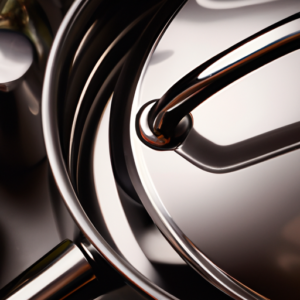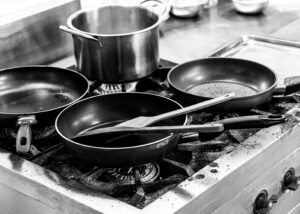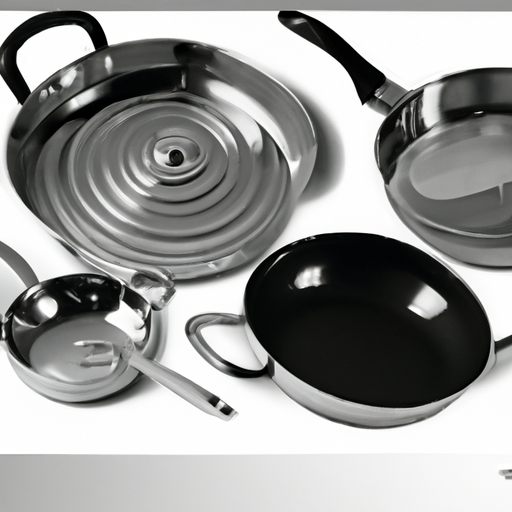Did you know? The safety of our cookware is of paramount importance. If you’re wondering if Calphalon cookware is safe to use, that’s because. Let me make you feel at ease. Calphalon cookware is free from harmful chemicals like PFOA and heavy metals. Calphalon cookware is safe to use in the oven, dishwasher, and even in the kitchen sink. Calphalon products do not contain any heavy metals, even when scratched. Now that is a plus! You can make delicious meals without worrying about the safety of your cookware.

This image is property of images.pexels.com.
Overview of Calphalon Cookware
Calphalon cookware is a popular choice for many home cooks due to its high quality and versatility. This comprehensive article will provide an overview of Calphalon cookware, its composition, features, benefits, and safety standards. We will also discuss the importance of cookware safety, potential health risks, and the comparison of Calphalon with other non-stick cookware brands.
Composition of Calphalon Cookware
Calphalon cookware is made with careful attention to its composition to ensure its safety and performance. One of the key components of Calphalon nonstick cookware is aluminum. Aluminum is known for its excellent heat conduction properties, allowing for even heat distribution during cooking. However, it is important to note that aluminum is a reactive metal that can leach into your food, especially when cooking with acidic ingredients or at high temperatures. Calphalon addresses this concern by adding layers of stainless steel or other materials to prevent direct contact between the aluminum and the food.
Features and Benefits
Calphalon cookware offers a range of features and benefits that make it a popular choice among home cooks. One of its main features is its nonstick coating, which allows for easy food release and effortless cleaning. This feature is especially useful when cooking delicate foods like eggs or fish, where sticking can be an issue. Calphalon nonstick cookware is also designed to be oven-safe, allowing for greater versatility in your cooking. Additionally, Calphalon cookware is known for its durability and long-lasting performance, making it a worthwhile investment for your kitchen.
Safety Standards
The safety of cookware is a crucial consideration for anyone who cares about their health and wellbeing. Calphalon understands this concern and has taken measures to ensure the safety of their cookware. Calphalon cookware does not contain heavy metals or other toxic substances that pose a risk to human health. This includes substances such as lead, cadmium, mercury, and PFOA. PFOA, or perfluorooctanoic acid, is a chemical that has been linked to various health issues and has been phased out of production. By adhering to strict safety standards, Calphalon ensures that their cookware is safe for cooking and does not pose any health risks.
Understanding Cookware Safety
Cookware safety is an important aspect to consider when choosing the right pots and pans for your kitchen. Different cookware materials can have varying effects on your health, depending on their composition and potential for leaching harmful substances into your food. In this section, we will explore the potential health risks associated with cookware and the importance of choosing non-toxic options.
Potential Health Risks with Cookware
Certain types of cookware can pose potential health risks if they are not made with safe materials and coatings. One of the primary concerns is the leaching of heavy metals, such as lead and cadmium, into your food. These metals have been linked to various health issues, including developmental problems in children and organ damage. Additionally, some non-stick coatings, such as Teflon, can release harmful fumes at high temperatures, which can be dangerous when inhaled.
The Importance of Non-Toxic Cookware
Choosing non-toxic cookware is essential for maintaining your health and wellbeing. Non-toxic cookware does not release harmful substances into your food and does not pose any risks to your health. It is especially important to opt for non-toxic cookware when cooking at high temperatures, as this can exacerbate the potential risks associated with certain materials or coatings. Non-toxic cookware provides peace of mind, knowing that your food is being prepared in a safe and healthy manner.
Comparison with Other Non-Stick Cookware Brands
When it comes to non-stick cookware, Calphalon stands out as a brand that prioritizes safety. However, it is worth exploring other non-stick cookware brands that also offer non-toxic options. Xtrema, GreenPan, and Caraway Cookware are examples of brands that are known for producing non-toxic cookware. These brands use alternative materials and coatings that do not have the same health risks as traditional non-stick coatings. Exploring these options allows you to make an informed decision based on your specific needs and preferences.
Calphalon Cookware and Toxic Substances
Calphalon cookware is designed with a commitment to safety, ensuring that it does not contain any toxic substances that could potentially harm your health. In this section, we will delve into the absence of heavy metals and harmful chemicals in Calphalon cookware, as well as its safety even when scratched.
Absence of Heavy Metals
One of the key safety features of Calphalon cookware is its exclusion of heavy metals. Heavy metals like lead, cadmium, and mercury can have detrimental effects on human health, especially when ingested over an extended period. Calphalon cookware undergoes rigorous testing to ensure that it does not contain these harmful metals, providing you with peace of mind while cooking.
Exclusion of Harmful Chemicals
Calphalon cookware is also free from harmful chemicals such as PFOA and PTFE. PFOA, as mentioned earlier, has been linked to various health issues and has been phased out of production. PTFE, commonly known as Teflon, is another non-stick coating that can release toxic fumes when heated to high temperatures. By excluding these chemicals from their manufacturing process, Calphalon ensures that their cookware is safe for use and does not pose any health risks.
Safety of Scratched Calphalon Cookware
There may be concerns about the safety of scratched cookware, as scratches can potentially expose the underlying material to the food being cooked. However, Calphalon cookware is designed to maintain its safety even when scratched. The absence of PTFE and other toxic substances ensures that even if the non-stick coating is compromised, the underlying materials will not pose any health risks. This feature allows for continued use of your Calphalon cookware without worrying about the potential dangers of scratched surfaces.
Specific Calphalon Cookware Types
Calphalon offers a wide range of cookware options, catering to different cooking styles and preferences. In this section, we will explore specific types of Calphalon cookware, including nonstick, stainless steel, cast iron, and ceramic.
Calphalon Nonstick Cookware
Calphalon nonstick cookware is a popular choice for those who prefer the convenience of easy food release and effortless cleanup. The nonstick coating allows for cooking with minimal oil or butter, reducing the overall fat content of your meals. Calphalon’s nonstick cookware is made of aluminum, ensuring excellent heat conduction and even cooking. It is also oven-safe, providing versatility in your cooking techniques.
Calphalon Stainless Steel Cookware
Stainless steel cookware is known for its durability and resistance to staining, making it a staple in many kitchens. Calphalon offers a range of stainless steel cookware options that provide even heat distribution and excellent searing capabilities. This type of cookware is compatible with all cooktops, including induction, and is oven-safe for added convenience. Calphalon stainless steel cookware upholds the brand’s commitment to safety, ensuring that it does not leach any harmful substances into your food.
Calphalon Cast Iron Cookware
Cast iron cookware has been used for centuries due to its excellent heat retention and even heat distribution. Calphalon cast iron cookware combines the traditional benefits of cast iron with modern enhancements such as enamel coating. This coating prevents the leaching of iron into your food, addressing the concerns of excess iron intake associated with uncoated cast iron cookware. Calphalon cast iron cookware is also compatible with all cooktops and is oven-safe.

This image is property of images.pexels.com.
Calphalon Ceramic Cookware
Ceramic cookware has gained popularity for its non-toxic nature and excellent heat retention. Calphalon ceramic cookware offers a healthy and safe cooking alternative, as it does not contain any harmful substances. The ceramic nonstick coating ensures easy food release without the need for excessive oil or butter. Calphalon ceramic cookware is also oven-safe and can withstand high cooking temperatures, making it suitable for various recipes and cooking methods.
Comparing Cookware Options
Choosing the right cookware involves considering the health implications of different materials and coatings. In this section, we will discuss the least toxic cookware options, health considerations of non-stick coatings, and non-toxic alternatives to Calphalon.
Least Toxic Cookware Options
If you prioritize non-toxic cookware, there are several options that you can consider. Cast iron, stainless steel, glass, and enamel coated cast iron are generally regarded as the “least toxic” cookware options. These materials do not leach harmful substances into your food and have a long history of safe use in the kitchen. Exploring these alternatives allows you to find a cookware material that aligns with your health concerns and cooking preferences.
Health Considerations of Non-Stick Coatings
Non-stick coatings, such as Teflon, have been a topic of concern due to their potential health risks. At high temperatures, non-stick coatings can release toxic fumes that can be harmful when inhaled. If you choose to use non-stick cookware, it is essential to cook at lower temperatures and ensure proper ventilation. Additionally, choosing non-toxic non-stick coatings, such as those found in Calphalon cookware, can minimize any potential risks associated with non-stick cookware.
Non-Toxic Alternatives to Calphalon
While Calphalon is a reputable brand known for its commitment to safety, there are other non-toxic cookware options available in the market. Xtrema, GreenPan, and Caraway Cookware are examples of brands that offer non-toxic alternatives to traditional non-stick cookware. These brands use alternative materials and coatings that do not pose the same health risks as traditional non-stick coatings, providing you with additional options when choosing non-toxic cookware.
Calphalon Cookware and Safe Use
Ensuring safe use of your cookware is essential to maintain its longevity and minimize any potential risks. In this section, we will discuss the safe use of Calphalon cookware in the oven and broiler, dishwasher safety precautions, and potential coating wear with high temperatures.
Safe Use in Oven and Broiler
Calphalon cookware is designed to be oven-safe, allowing for versatile cooking techniques. However, it is important to adhere to the specific temperature recommendations provided by Calphalon for each cookware item. Exceeding these temperature limits can compromise the integrity of the cookware and potentially pose safety risks. Additionally, when using Calphalon cookware in the broiler, it is essential to ensure that the handle is positioned away from direct heat to prevent any damage.
Dishwasher Safety Precautions
Calphalon cookware is generally dishwasher-safe, making cleanup a breeze. However, it is important to follow certain safety precautions when using the dishwasher. Harsh dishwasher cycles and high temperatures can cause wearing off of the non-stick coating over time, reducing its effectiveness. To prolong the lifespan of your Calphalon cookware, it is recommended to hand wash it using gentle dish soap and a soft sponge whenever possible.

This image is property of images.pexels.com.
Potential Coating Wear with High Temperatures
High temperatures, especially when cooking on the stovetop, can potentially lead to the wear and degradation of the non-stick coating on your Calphalon cookware. While Calphalon cookware is designed to withstand high cooking temperatures, prolonged exposure to excessive heat can reduce the lifespan of the coating. To maximize the longevity of the non-stick coating, it is advisable to cook on medium to low heat settings and avoid preheating the cookware without any food or oil.
Stainless Steel and Cookware Safety
Stainless steel cookware is a popular choice among home cooks, known for its durability and versatility. In this section, we will address concerns regarding the toxicity of stainless steel, the link between cancer and chromium, and the safety of Calphalon stainless steel cookware.
Toxicity Concerns with Stainless Steel
Stainless steel is generally considered safe for cooking, as it does not react with most foods and does not leach harmful substances into your dishes. However, certain types of stainless steel can contain small amounts of potentially harmful elements, such as nickel and chromium. It is important to choose high-quality stainless steel cookware to minimize any potential risks associated with these elements.
Link Between Cancer and Chromium
Chromium, a common element found in stainless steel, has been associated with an increased risk of cancer in certain forms. However, the levels of chromium present in stainless steel cookware are typically low and do not pose significant health risks. Calphalon stainless steel cookware meets safety standards and does not contain excessive amounts of chromium, ensuring its safety for use in your kitchen.
Safety of Calphalon Stainless Steel Cookware
Calphalon stainless steel cookware undergoes rigorous testing and manufacturing processes to ensure its safety. It does not contain heavy metals or toxic substances that can pose health risks. Calphalon stainless steel cookware is designed to offer excellent heat distribution, durability, and easy maintenance. By choosing Calphalon stainless steel cookware, you can enjoy the benefits of this versatile material without compromising your health and safety.
Addressing Concerns about Teflon
Teflon, a popular non-stick coating, has been a subject of concern due to potential health risks associated with its use. In this section, we will address concerns regarding the link between Teflon coating and cancer risk, the absence of Teflon in Calphalon cookware, and any potential cancer association with Calphalon products.
Teflon Coating and Cancer Risk
Teflon has faced scrutiny due to its potential to release toxic fumes at high temperatures, which can be harmful when inhaled. The fumes from Teflon can cause flu-like symptoms and have been linked to adverse health effects in animals. However, studies have not found a direct link between Teflon coating and cancer in humans. It is important to note that these concerns arise primarily under high heat conditions, such as overheating an empty pan.
Absence of Teflon in Calphalon Cookware
Calphalon cookware does not use Teflon coating in its manufacturing process, ensuring that you can cook without worrying about the potential risks associated with Teflon. The non-stick coatings used in Calphalon cookware are carefully selected to provide excellent performance without compromising your health and safety. By choosing Calphalon, you can enjoy the benefits of non-stick cooking without the concerns surrounding Teflon.
Cancer Association with Calphalon Products
Calphalon cookware does not pose any known risks of cancer or other adverse health effects when used as intended. The brand takes great care in ensuring that their cookware meets strict safety standards and does not contain any harmful substances. Calphalon has a long history of prioritizing the safety of their products, making them a trusted option for your cooking needs.
Factors Affecting Calphalon Cookware Safety
Several factors can influence the safety of Calphalon cookware and your overall cooking experience. In this section, we will discuss the proper handling and maintenance of Calphalon cookware, the impact of temperature and cooking techniques, and the longevity of safe use.
Proper Handling and Maintenance
Proper handling and maintenance are essential for maximizing the safety and lifespan of your Calphalon cookware. It is important to follow the manufacturer’s guidelines regarding the use and care of the cookware to ensure its longevity. Using the appropriate utensils, avoiding metal utensils that can scratch the non-stick coating, and hand washing with gentle dish soap are recommended practices for maintaining the integrity of your Calphalon cookware.
Temperature and Cooking Techniques
Temperature and cooking techniques play a crucial role in the safety and performance of your Calphalon cookware. Using moderate heat settings and avoiding overheating can help prevent potential risks associated with high temperatures. It is also important to match the cookware to the specific cooking technique, as different materials and coatings have varying heat tolerance. By understanding the limitations and recommendations of your Calphalon cookware, you can ensure safe and effective cooking.
Longevity of Safe Use
Calphalon cookware is built to last and provide safe use throughout its lifespan. With proper care and maintenance, Calphalon cookware can continue to provide excellent performance and safety. It is important to periodically inspect your cookware for any signs of wear or damage, such as scratches or peeling coatings. If any issues arise, it is advisable to discontinue use and replace the affected cookware to maintain the highest level of safety.
Conclusion
Calphalon cookware is a trusted brand that prioritizes safety and performance. Its composition, safety standards, and range of cookware options make it a popular choice among home cooks. By understanding the importance of cookware safety, the potential health risks associated with different materials and coatings, and the safe use guidelines, you can make an informed decision for your culinary needs. Whether you choose Calphalon cookware or explore non-toxic alternatives, prioritizing the safety of your cookware ensures a healthy and enjoyable cooking experience.


